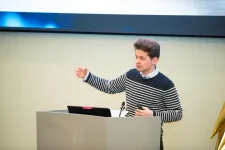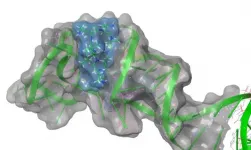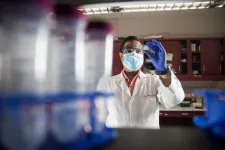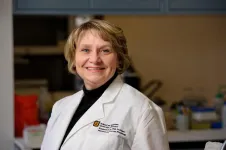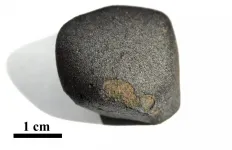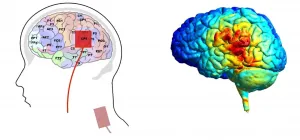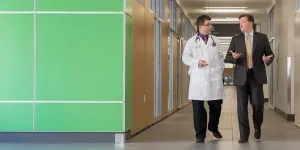INFORMATION:
NUST MISIS scientists develop fastest-ever quantum random number generator
2021-01-21
(Press-News.org) An international research team has developed a fast and affordable quantum random number generator. The device created by scientists from NUST MISIS, Russian Quantum Center, University of Oxford, Goldsmiths, University of London and Freie Universität Berlin produces randomness at a rate of 8.05 gigabits per second, which makes it the fastest random number generator of its kind. The study published in Physical Review X is a promising starting point for the development of commercial random number generators for cryptography and complex systems modeling.
ELSE PRESS RELEASES FROM THIS DATE:
OHIO researchers ID potential target for anti-viral drugs to battle COVID
2021-01-21
ATHENS, Ohio (Jan. 20, 2021) - While the world awaits broad distribution of COVID-19 vaccines, researchers at Ohio University just published highly significant and timely results in the search for another way to stop the virus -- by disrupting its RNA and its ability to reproduce.
Dr. Jennifer Hines, a professor in the Department of Chemistry and Biochemistry, along with graduate and undergraduate students in her lab, published the first structural biology analysis of a section of the COVID-19 viral RNA called the stem-loop II motif. This is a non-coding section of the RNA, which means that it is not translated into a protein, but it is likely key to the ...
University of Kentucky researchers link low blood amylin level to reduced progression of Alzheimer's
2021-01-21
LEXINGTON, Ky. (January 20, 2021) - More than 5.7 million Americans live with Alzheimer's disease and that number is projected to triple by 2050. Despite the growing number there is not a cure. Florin Despa a professor with the University of Kentucky's department of pharmacology and nutritional sciences says, "The mechanisms underlying neurodegenerative diseases are largely unknown and effective therapies are lacking." That is why numerous studies and trials are ongoing around the world including at the University of Kentucky. One of those studies by University of Kentucky researchers was recently published in Alzheimer's & Dementia: Translational Research & Clinical Interventions. It is the ...
Age provides a buffer to pandemic's mental health impact, University of Connecticut researchers say
2021-01-21
Older adults are managing the stress of the coronavirus pandemic better than younger adults, reporting less depression and anxiety despite also experiencing greater general concern about COVID-19, according to a study recently published by researchers at the UConn School of Nursing.
Their somewhat paradoxical findings, published last month in the journal Aging and Mental Health, suggest that although greater psychological distress has been reported during the pandemic, older age may offer a buffer against negative feelings brought on by the virus's impact.
"When you think about older adulthood, oftentimes, there are downsides. For example, with regard to physical well-being, we don't recover as well from injury or ...
Beetles reveal how to hide the body
2021-01-21
Not long after the sun goes down, pairs of burying beetles, or Nicrophorus orbicollis, begin looking for corpses.
For these beetles, this is not some macabre activity; it's house-hunting, and they are in search of the perfect corpse to start a family in. They can sense a good find from miles away, because carrion serves as a food source for countless members of nature's clean-up crew. But because these beetles want to live in these corpses, they don't want to share their discovery. As a result, burying beetles have clever ways of claiming their decaying prize all for themselves. In new research published in The American Naturalist, researchers from UConn and The University of Bayreuth have found these beetles recruit microbes to help throw rivals off the scent.
Immediately following ...
Researchers study what happens to your body during tailgating
2021-01-21
The NFL playoffs are underway, and fans are finding ways to simulate tailgating during the COVID-19 pandemic. Football watch parties are synonymous with eating fatty foods and drinking alcohol. Have you ever wondered what all of that eating and drinking does to your body?
Researchers from the University of Missouri School of Medicine simulated a tailgating situation with a small group of overweight but healthy men and examined the impact of the eating and drinking on their livers using blood tests and a liver scan. They discovered remarkably differing responses in the subjects.
"Surprisingly, we found that in overweight men, after an afternoon of eating and drinking, how their bodies reacted to food and drink was not uniform," said Elizabeth Parks, PhD, professor of nutrition and ...
Tree rings and the Laki volcano eruption: A closer look at climate
2021-01-21
University of Arizona researchers read between the lines of tree rings to reconstruct exactly what happened in Alaska the year that the Laki Volcano erupted half a world away in Iceland. What they learned can help fine-tune future climate predictions.
In June 1783, Laki spewed more sulfur into the atmosphere than any other Northern Hemisphere eruption in the last 1,000 years. The Inuit in North America tell stories about the year that summer never arrived. Benjamin Franklin, who was in France at the time, noted the "fog" that descended over much of Europe in the aftermath, and correctly reasoned that it led to an unusually cold winter on the continent.
Previous analyses of annual tree rings have shown that the entire 1783 growing season for the spruce ...
Oldest carbonates in the solar system
2021-01-21
A meteorite that fell in northern Germany in 2019 contains carbonates which are among the oldest in the solar system; it also evidences the earliest presence of liquid water on a minor planet. The high-resolution Ion Probe - a research instrument at the Institute of Earth Sciences at Heidelberg University - provided the measurements. The investigation by the Cosmochemistry Research Group led by Prof. Dr Mario Trieloff was part of a consortium study coordinated by the University of Münster with participating scientists from Europe, Australia and the USA.
Carbonates are ubiquitous rocks on Earth. They can be found in the mountain ranges of the Dolomites, the chalk cliffs on the island of Rügen, and in the coral reefs of the ...
Direct current stimulation of the brain over Wernicke's area can help people learn new words
2021-01-21
Transcranial direct current stimulation (tDCS) is a non-invasive method of brain stimulation, in which electrodes are applied over certain places on the scalp, creating a weak electric field. It is currently used for a variety of purposes: from treating depression and pain syndromes to better acquisition of new words and even sports techniques.
During stimulation, the active electrode can transmit a positive or negative electrical charge. In the former case, this stimulation is called 'anodal'; in the latter one, it is called 'cathodal'. Researchers believe that anodal tDCS generally leads to depolarisation of neurons, which increases the likelihood of their excitation when new information arrives. Cathodal ...
Incentivizing vaccine adherence: could it be the key to achieving herd immunity?
2021-01-21
As the United States struggles to control record-breaking increases in COVID-19 infections and hospitalizations, the roll-out of two approved vaccines offers tremendous hope for saving lives and curbing the pandemic. To achieve success, however, experts estimate that at least 70 to 90 percent of the population must be inoculated to achieve herd immunity, but how can we ensure folks will voluntarily receive a vaccine?
Both vaccines require two injections. Pfizer-BioNTech's second dose must be given 21 days after the first and Moderna's second dose must be administered 28 days after the first. While public health and infectious disease experts have discussed strategies to enhance adherence, including the potential use of financial incentives, ...
Target of new cancer treatment valid for breast as well as blood cancers: study
2021-01-21
One more piece of the puzzle has fallen into place behind a new drug whose anti-cancer potential was developed at the University of Alberta and is set to begin human trials this year, thanks to newly published research.
"The results provide more justification and rationale for starting the clinical trial in May," said first author John Mackey, professor and director of oncology clinical trials in the Faculty of Medicine & Dentistry. "It's another exciting stepping stone to finding out if this is going to be a new cancer treatment."
The drug PCLX-001 is designed to selectively kill cancer cells by targeting enzymes ...
